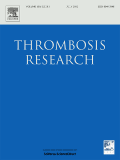
THROMBOSIS RESEARCH
Scope & Guideline
Advancing the Science of Hemostasis and Thrombosis
Introduction
Aims and Scopes
- Thrombosis Mechanisms and Pathophysiology:
Research exploring the underlying mechanisms of thrombosis, including genetic, molecular, and cellular factors that contribute to thrombus formation and resolution. - Clinical Management of Thrombotic Disorders:
Studies focused on the clinical aspects of thrombosis management, including treatment protocols, anticoagulation strategies, and patient outcomes across various conditions, particularly in cancer and surgery. - Impact of Anticoagulants and Novel Therapies:
Evaluating the efficacy and safety of anticoagulant therapies, including direct oral anticoagulants (DOACs), low molecular weight heparins, and emerging treatments in diverse patient populations. - Risk Assessment and Predictive Models:
Development and validation of risk assessment tools and models to predict thrombotic events in various clinical settings, enhancing patient stratification and management. - Thrombosis and Systemic Conditions:
Investigations into the relationship between thrombosis and systemic diseases, including infections, autoimmune disorders, and malignancies, highlighting the complexity of coagulation in these contexts. - Innovative Diagnostic Techniques:
Research on novel diagnostic methodologies for the detection and monitoring of thrombotic conditions, including imaging techniques and biomarker assessments.
Trending and Emerging
- COVID-19 and Thrombosis:
An increasing number of studies are investigating the thrombotic complications associated with COVID-19, including mechanisms, risk factors, and management strategies, indicating a significant shift in research focus due to the pandemic. - Cancer-Associated Thrombosis:
There is a marked rise in research related to thrombosis in cancer patients, exploring the complexities of managing thrombotic events in this vulnerable population and the implications of anticancer therapies on thrombotic risk. - Machine Learning and Predictive Analytics:
Emerging themes in the application of machine learning and predictive analytics for thrombotic risk assessment and management, showcasing the integration of technology and data science in clinical practice. - Patient-Centered Approaches:
A growing emphasis on patient-reported outcomes and experiences related to thrombotic conditions and their management, reflecting a broader trend towards personalized medicine. - Thrombosis in Pediatric Populations:
An increase in studies focusing on thrombosis in pediatric patients, highlighting the unique challenges and considerations in this demographic, including implications for long-term health. - Interdisciplinary Research:
An upward trend in interdisciplinary studies that explore the intersection of thrombosis with other medical fields, such as immunology and cardiology, indicating a holistic approach to understanding thrombotic diseases.
Declining or Waning
- Traditional Anticoagulant Therapies:
There seems to be a declining emphasis on older anticoagulant therapies, such as vitamin K antagonists, as research increasingly focuses on direct oral anticoagulants and their advantages. - Basic Laboratory Studies in Thrombosis:
A reduction in basic laboratory research related to thrombosis mechanisms, with a shift towards clinical and translational studies that directly impact patient care. - Isolated Studies on Specific Thrombosis Types:
Fewer publications are addressing isolated forms of thrombosis, such as superficial vein thrombosis, as the journal's focus expands to encompass broader, more integrated studies that consider multiple thrombotic events and their systemic implications.
Similar Journals

Blood and Lymphatic Cancer-Targets and Therapy
Exploring New Horizons in Cancer TherapyBlood and Lymphatic Cancer-Targets and Therapy, published by DOVE MEDICAL PRESS LTD, is a vital open-access journal that has been disseminating crucial research and findings in the field of hematology and oncology since 2011. With its ISSN 1179-9889, this journal focuses on the latest therapeutic targets and innovative treatment strategies for blood and lymphatic cancers, contributing significantly to the advancement of knowledge and practice in this specialized area. Designed for researchers, healthcare professionals, and students alike, Blood and Lymphatic Cancer-Targets and Therapy aims to foster a deeper understanding of cancer biology and promote collaborative efforts leading to novel therapeutic interventions. The open-access model ensures that research findings are readily accessible to a global audience, underscoring the journal's commitment to enhancing patient care and fostering educational growth in the cancer domain.
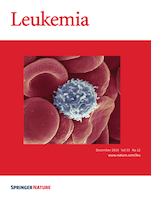
LEUKEMIA
Bridging Science and Practice in HematologyLEUKEMIA, published by SpringerNature, is a premier journal in the field of hematology and oncology, with ISSN 0887-6924 and E-ISSN 1476-5551. Established in 1987, this esteemed publication serves as a critical platform for disseminating groundbreaking research and comprehensive reviews on the pathophysiology, diagnosis, and treatment of leukemia and related hematological disorders. With a distinguished impact, it holds a top-tier status in several categories, including Q1 rankings in Anesthesiology and Pain Medicine, Cancer Research, Hematology, and Oncology for 2023. The journal is globally recognized for its rigorous peer-review process and is highly regarded among academia, evidenced by its impressive Scopus rankings—7th in Hematology and 24th in Oncology. Researchers, clinicians, and students alike will benefit from the rich content that this journal offers, making it an invaluable resource in the fight against leukemia. The main objective of LEUKEMIA is to advance knowledge and encourage further innovations within the field, ensuring that vital insights reach practitioners and researchers around the world.

Blood Research
Transforming Knowledge into Clinical ExcellenceBlood Research, published by SPRINGER, is a premier journal dedicated to the multifaceted realm of hematology, serving as a crucial platform for disseminating innovative research findings and advancements in the diagnosis and treatment of blood-related disorders. With an ISSN of 2287-979X and an E-ISSN of 2288-0011, this journal is recognized for its commitment to scholarly excellence and impact in the field, currently holding a reputable Q2 ranking in the Hematology category as per the 2023 metrics. The journal spans from 2013 to 2024, providing a broad archive of quality research that is vital for researchers, healthcare professionals, and students alike. Although it is not an Open Access journal, it offers insightful contributions that enhance the understanding of hematological science, fostering the exchange of knowledge crucial for advancing patient care and clinical practices globally. The journal’s performance is underscored by its Scopus ranking in the 46th percentile, reflecting its significant role in the ongoing discourse in hematology.

Indian Journal of Hematology and Blood Transfusion
Inspiring Progress in Blood Health Through Rigorous ResearchIndian Journal of Hematology and Blood Transfusion, published by SPRINGER INDIA, serves as a leading platform for disseminating original research, reviews, and case studies in the field of hematology. With an ISSN of 0971-4502 and E-ISSN 0974-0449, this journal has been instrumental in advancing knowledge from 2000 to 2024, providing insights into critical issues surrounding blood disorders and transfusion practices. Currently ranked in the Q3 category for Hematology for 2023, it reflects a commitment to high-quality scientific content amidst a competitive landscape where it ranks 97/137 in Scopus for Medicine - Hematology, placing it in the 29th percentile of its peers. The journal primarily addresses a diverse readership, including researchers, healthcare professionals, and students, aiming to foster innovation and collaboration within the field. Although it operates under a subscription model, access options for individual articles and institutional subscriptions ensure that valuable research is disseminated widely to enhance medical practice and education in hematology.
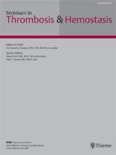
SEMINARS IN THROMBOSIS AND HEMOSTASIS
Transforming clinical practice through cutting-edge findings.SEMINARS IN THROMBOSIS AND HEMOSTASIS is a prestigious academic journal dedicated to advancing the understanding and practice of thrombosis and hemostasis, published by THIEME MEDICAL PUBL INC. With an ISSN of 0094-6176 and an E-ISSN of 1098-9064, this journal plays a critical role in disseminating groundbreaking research and reviews in the fields of cardiology and hematology. As of 2023, it holds a commendable Q2 ranking in both the Cardiology and Cardiovascular Medicine and Hematology categories, with Scopus ranks of #55 out of 387 and #23 out of 137, respectively, positioning it within the top percentiles of these disciplines. The journal publishes articles that bring forth innovative findings and facilitate clinical applications, making it an essential resource for researchers, healthcare professionals, and students focused on improving patient care and outcomes. Since its inception in 1974, SEMINARS IN THROMBOSIS AND HEMOSTASIS continues to evolve with the changing landscape of medical research, striving to fill the gaps in knowledge and foster an informed approach to hemostatic disorders.
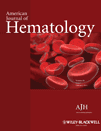
AMERICAN JOURNAL OF HEMATOLOGY
Transforming Research into Clinical BreakthroughsAmerican Journal of Hematology, published by Wiley, stands as a premier outlet for the dissemination of cutting-edge research in the field of hematology. With a commendable impact factor and ranked #9 out of 137 in the Scopus medicine category, this journal has established a robust presence since its inception in 1976. Operating in the Q1 quartile for hematology, it serves as a crucial resource for researchers, clinicians, and students dedicated to understanding blood disorders and advancing treatment methodologies. While the journal does not currently offer open access options, it remains highly regarded for its rigorous peer-review process and impactful contributions to the scientific community. With coverage extending into 2024, the American Journal of Hematology is committed to fostering innovation and collaboration within the hematological sciences.

Journal of Vascular Surgery-Venous and Lymphatic Disorders
Unveiling the future of vascular surgery and patient care.The Journal of Vascular Surgery-Venous and Lymphatic Disorders, published by Elsevier, is a distinguished peer-reviewed journal dedicated to advancing the knowledge and practice of vascular surgery with a particular focus on venous and lymphatic conditions. With an ISSN of 2213-333X and a robust impact factor, this journal ranks Q2 in Cardiology and Cardiovascular Medicine and Q1 in Surgery, reflecting its high relevance and contribution to the field. Covering a wide spectrum of topics from innovative surgical techniques to the latest developments in venous and lymphatic disorders, the journal serves as a vital resource for researchers, clinicians, and students alike. It not only disseminates cutting-edge research but also promotes best practices and interdisciplinary collaboration within the cardiovascular domain. The journal is accessible to a global audience, ensuring that impactful findings reach practitioners and researchers everywhere, further elevating the standards of patient care and surgical excellence.
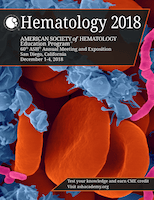
Hematology-American Society of Hematology Education Program
Fostering Excellence in Hematological ResearchHematology-American Society of Hematology Education Program is a premier peer-reviewed journal dedicated to advancing the field of hematology through comprehensive educational content. Published by the American Society of Hematology, this journal plays a crucial role in disseminating knowledge to researchers, clinicians, and students in hematology and related disciplines. With an impressive Q1 status in the field, it ranks among the top journals at the forefront of hematological research, as evidenced by its 60th percentile ranking in Scopus' Medicine - Hematology category. Although it does not offer open access, the journal provides invaluable insights and educational resources from leading experts, focusing on the latest advancements, treatment protocols, and evolving understanding of blood disorders. Covering a wide range of topics, from basic research to clinical applications, this journal is essential for anyone seeking to deepen their expertise and stay informed on the latest developments in hematology. For further engagement, readers can access insightful articles published since 2001, ensuring a rich repository of knowledge for ongoing research and clinical excellence.

HemaSphere
Connecting researchers, clinicians, and students in hematology.HemaSphere, published by WILEY, stands at the forefront of hematology research, offering a vital platform for the dissemination of cutting-edge findings in the field. Since its inception in 2017 and official transition to Open Access in 2018, the journal has positioned itself as a leading conduit for high-impact research, maintaining a prestigious Q1 quartile ranking in the Hematology category as of 2023. Addressed in the United States at 111 River St, Hoboken, NJ, HemaSphere aims to foster a global dialogue among researchers, clinicians, and students by providing unrestricted access to high-quality content that encompasses clinical and experimental advancements. With an array of engaging articles, reviews, and commentaries, HemaSphere contributes significantly to the advancement of hematology, ensuring that critical knowledge is readily accessible to enhance patient care and innovative research. To explore the latest developments and breakthroughs in this dynamic field, we invite scholars, professionals, and students to engage with HemaSphere and elevate their understanding of hematologic science.
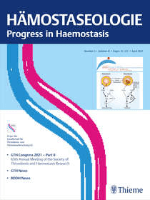
Hamostaseologie
Decoding Hemostasis: Your Source for Cutting-Edge Research and ReviewsHamostaseologie is a prominent academic journal dedicated to the field of hematology, published by GEORG THIEME VERLAG KG. With an ISSN of 0720-9355 and an E-ISSN of 2567-5761, this journal has been at the forefront of critical research and advancements since its inception in 1981, and it continues to maintain its relevance in the scientific community with a converged publication until 2024. Ranked in the Q3 quartile in Hematology for 2023, and positioned at #44 out of 137 in the Scopus Medicine Hematology category, it represents a substantial contribution to scholarly discourse. Researchers and professionals alike will find valuable insights within its pages, as it disseminates rigorous studies and reviews that address pertinent issues related to hemostasis and coagulation. While the journal does not currently offer Open Access, readers can access its valuable content through institutional subscriptions, making it an essential resource for students, clinicians, and researchers aiming to deepen their understanding of hematological science.